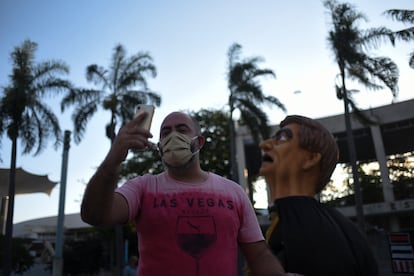Bolsonaro and his supporters turn to Telegram to avoid being silenced for spreading fake news
Fearing bans from Facebook and Twitter, the Brazilian president is using the more permissive social media platform to converse with his support base ahead of the October election


Jair Bolsonaro’s popularity on the electoral polls is dwindling by the month. But that did not stop the Brazilian president from staging an eloquent online show of force a few weeks ago, when he was won Time magazine’s Person of the Year reader poll. Tesla founder Elon Musk was named the most influential person of 2021 by Time itself. Bolsonaro claimed a quarter of the nine million votes cast online, comfortably beating former US president Donald Trump, who he greatly admires. Courtesy of the mobilization of his supporters, the right-wing politician gave a timely reminder that he maintains his digital power.
The campaign to have Bolsonaro anointed by Time was forged on Telegram, the new digital platform of choice of the Brazilian president and other democracy-eroding right-wing leaders worldwide. It is the space where they seek refuge from the measures against misinformation and fake news being adopted by Facebook, Twitter, Google and YouTube.
The half-truths and lies that circulate on social media played a prominent role during the last elections in Brazil: the internet was crucial to Bolsonaro’s victory. With elections to be held in October, electoral authorities are particularly concerned by Telegram, which is swiftly amassing users and with which they have not yet been able to establish any kind of dialogue.
Days after Bolsonaro emerged as one of Time’s people of the year, the president of the Superior Electoral Court, Luís Roberto Barroso, wrote to the founder and CEO of Telegram, 37-year-old Russia-born Pavel Durov. The Brazilian magistrate asked Durov to cooperate with efforts to combat misinformation. He provided two facts to back his petition: the application is downloaded to half of all cell phones in Brazil and “right now conspiracy theories and false information about the electronic voting system are being disseminated on Telegram,” his email stated. The Russian Zuckerberg has not responded and his company, which is headquartered in Dubai, does not have any representatives in Brazil.
Bolsonarism (and Trumpism) landed on Telegram almost exactly a year ago, after the 2021 attack on the United States Capitol, when Twitter suspended Trump’s account for initiating the violent protest. The hitherto most powerful politician in the world was left without his primary loudspeaker and Bolsonaro took note. “Sign up to my official Telegram account,” he urged his followers. Thus began the campaign to seek refuge in a space with fewer restrictions on the digital strategy that catapulted Bolsonaro to power. And it worked. The retired military officer has a million followers, more than any other world leader. He is followed by Trump (who has an unofficial account) and the presidents of Turkey, Uzbekistan, Ethiopia and Mexico, according to a report by Núcleo Jornalismo, a Brazilian website dedicated to analyzing the impact of social networks on people’s lives.

The last election was the most polarizing in the history of Brazil. The next one will also be a dogfight and foul play is likely to abound. Brazil is fertile ground for misinformation, data verifier Cristina Tardáguila explained in a recent edition of the Americas Quarterly podcast. She backed this assertion for three reasons: the news landscape beyond São Paulo, Rio de Janeiro and Brasília is a wasteland because there is no independent press; 80% of Brazilians get most of their news from WhatsApp and there is a lack of fact-checkers.
In addition, Brazil’s population is hooked on the internet like few others, there is widespread mistrust of the institutions and the country is led by a science-denying president, who has sown doubt over the voting process – a cocktail that has great potential to infect the electoral campaign with misinformation, with the added fear that Bolsonaro will refuse to recognize the results if he loses.
“Telegram has become an important tool for politicians to speak to their grassroots supporters because it has fewer moderation controls and offers more broadcasting resources,” the Núcleo Jornalismo report states. Bolsonaro’s account is propaganda 2.0, a flood of information about governmental achievements with the added attraction that anyone can comment on posts anonymously. Phrases such as “what you won’t find out from the press” are the typical hook.
Telegram was created by Durov in 2013. It has been downloaded over a billion times globally and as a measure of its increasing success, it added 70 million new users in a single day last October. At first glance it is similar to WhatsApp, even its appearance is similar, but the moderation rules are considerably laxer. There is a ban on incitement of violence or terrorism, and on pornography, but it offers carte blanche to those who wish to hideously distort facts or to lie unscrupulously. This is a huge advantage for a politician like Bolsonaro, who has been censored by Twitter, Facebook and Instagram for misinformation. The Trump precedent weighs heavily.

Telegram also allows for groups of 200,000 people, as opposed to the limit of 256 on WhatsApp, which was set up to prevent fake news from going viral, something that was prevalent during the last general election campaign in Brazil. On Telegram, anyone can join a group, without an invitation.
If WhatsApp was the protagonist of the 2018 elections, the stage is set for Telegram to have a similar influence in 2022. Bolsonaro’s children, like-minded members of Congress and leading pro-Bolsonaro figures – such as the fugitive blogger Allan dos Santos, who has been investigated for disseminating fake news and blocked from other social networking sites – have followed the president to this new digital territory. For those loyal to Bolsonaro, Dos Santos is a free-speech martyr and Supreme Court magistrates mere censors of critical voices.
As part of its strategy to stamp out misinformation, Brazil’s Superior Electoral Court has succeeded in getting Google to set up new requirements for campaign advertising and to publicly report who is paying for adverts. The highest electoral authority is also in negotiations with other big tech companies to ensure that the elections are clean.
Bolsonaro disdains the traditional press. Since he assumed office, he has launched a frontal assault against the largest media outlets. He much prefers the universe of social networks, where he has amassed 45 million followers. For Bolsonaro, Telegram is a platform more geared toward “interacting with the people” – without, of course, the inconvenience of being held accountable or having to respond to too much criticism. It is his comfort zone because it has become frosty beyond the confines of the digital sphere. It is more and more common for the president to be subjected to jeers during his carefully controlled public appearances and there is constant criticism over his handling of the coronavirus pandemic, inflation and unemployment.
Since Lula da Silva’s political rights were restored, the former president has strengthened his social media presence but he remains light years behind Bolsonaro’s numbers. On Telegram, Da Silva has 46,000 followers and on Twitter, three million, but the habitat where the former trade unionist feels genuinely comfortable is in the analog world of rallies and hugging supporters. Although the pandemic has prevented Da Silva from fully re-entering the melee, he has been comfortably leading Bolsonaro in the polls for months.
Tu suscripción se está usando en otro dispositivo
¿Quieres añadir otro usuario a tu suscripción?
Si continúas leyendo en este dispositivo, no se podrá leer en el otro.
FlechaTu suscripción se está usando en otro dispositivo y solo puedes acceder a EL PAÍS desde un dispositivo a la vez.
Si quieres compartir tu cuenta, cambia tu suscripción a la modalidad Premium, así podrás añadir otro usuario. Cada uno accederá con su propia cuenta de email, lo que os permitirá personalizar vuestra experiencia en EL PAÍS.
¿Tienes una suscripción de empresa? Accede aquí para contratar más cuentas.
En el caso de no saber quién está usando tu cuenta, te recomendamos cambiar tu contraseña aquí.
Si decides continuar compartiendo tu cuenta, este mensaje se mostrará en tu dispositivo y en el de la otra persona que está usando tu cuenta de forma indefinida, afectando a tu experiencia de lectura. Puedes consultar aquí los términos y condiciones de la suscripción digital.








































